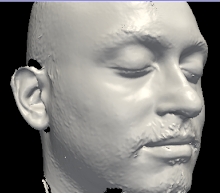It felt good to visit Imperial college. As of writing, happens to be ranked first in computer science (next year it will be cambridge) in the UK. It was good fortune that I called for an interview for a PhD position within the medical imaging group. I met people doing interesting work, and it will be safe to say that this is the only interview I have ever enjoyed in my life.
To my surprise, two of my interviewers (Prof. DR and Prof. DG) decided to show me around the department (its big, seemed bigger than U. Toronto). At the end of the tour, I met a gentleman called Chandrashekhara who had finished his physics degree from Oxford. He showed me what his PhD is all about, and how he's created a deformation model for the left ventricle of the heart. It was quite intriguing how much you could make a computer do. His deformation model can be used by clinicians to compute the strain and rotational movements the ventricle undergoes while the heart pumps blood in and out. The model is, ofcourse, computer-generated and was picked up from image sequences generated by MRI scans. Right now, he is working on reducing the number of degrees of freedoms of the deformation model, in order to reduce the computations required to animate the model. What it all means - the computer world meets the world of medical diagnostics and this was very interesting!
Medical image analysis is an exciting field, but how long it will remain to be exciting is another issue. It is refreshing coming from a machine vision background, where CCTV footage analysis is becoming a saturated field and this is what one of my interviewers predicted. Too many researchers were flocking into this field to solve its difficult problems. And what better time to ask for funding when public security and surveillance is a top issue. Sometimes it is better to do PhD in an area that is new and exciting .. meaning it will give you enough years to survive after your PhD in those postdoc years before the field and excitement dies out and people/Profs move on.

